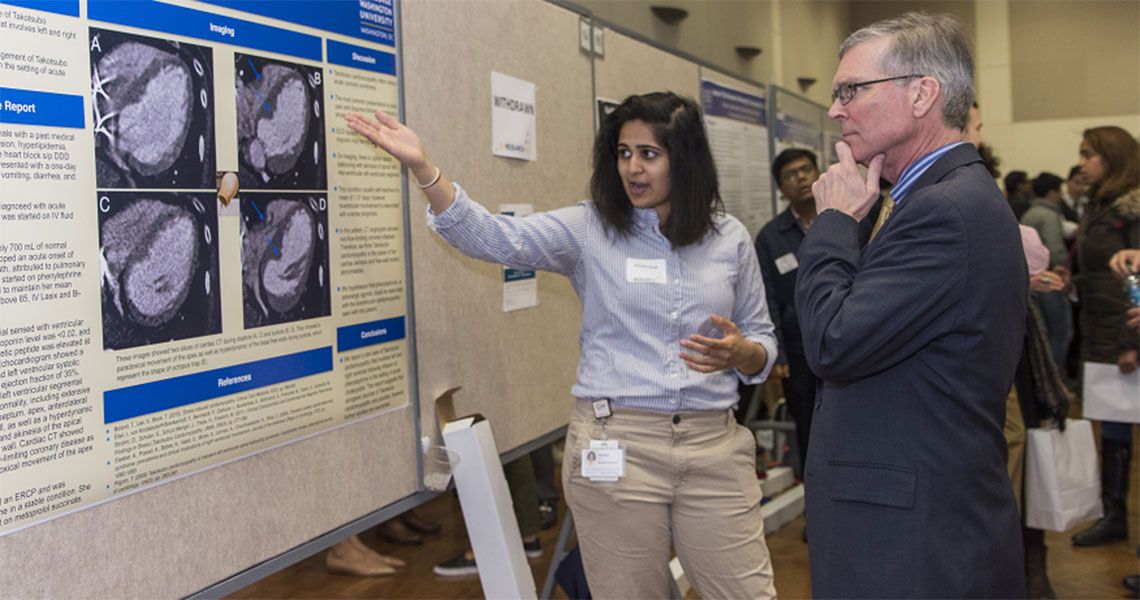When James Boddu and Ajlan Al Zaki, both second-year medical students at the GW School of Medicine and Health Sciences (SMHS), took over as editors of Fusion, the William H. Beaumont Medical Research Honor Society’s student-led publication, they wanted to do “something different” for Research Days, said Robert Miller, Ph.D., senior associate dean for research, Vivian Gill Distinguished Research Professor, and professor of anatomy and regenerative biology at SMHS.
Miller and the two editors discussed different possibilities for the two-day event, which highlights the research endeavors across George Washington’s 10 schools. The second day, in particular, focuses on research in the health and medical communities — including the efforts of SMHS, the GW School of Nursing, the GW Milken Institute of Public Health, the Institute for Biomedical Sciences, and the Department of Biomedical Engineering — and traditionally features two keynote speakers. This year, thanks to Boddu, Al Zaki, and Miller, Research Day tipped toward student ambitions.
“We decided over a series of discussions that it would be a terrific opportunity [for students] to hear what some of their colleagues have been doing as part of this Research Day,” Miller said.
Al Zaki and Boddu created an application process for student researchers to submit proposals to Fusion; the student editorial board then assessed the abstracts and selected three as the winners of the prestigious William Beaumont Research Award. Those three — first-year M.D. program student Siyang “Charlie” Chaili and second-year M.D. program students Nicole A. Doria and Angeline Pham — presented at the March 30 session.
“It’s a real privilege to help augment the research presence here at GW,” said Chaili, who discussed his first-place winning study, “Efficacy of Intravenous Kinocidins in a Neutropenic Murine Model of Multi-Drug-Resistant Acinetobacter Baumanii (MDRAB) Pneumonia.” “As students, we really strive to be excellent in every way, to represent GW well.”
Doria, who presented on “Cutaneous Infection with Leishmania Major Mediates Heterologous Protection against Visceral Infection with Leishmania Infantum,” and Pham, whose research was “Hypoxia Results in White Matter Immaturity in a Piglet Model of Congenital Heart Disease,” agreed.
“A lot of times, students worry it is difficult to conduct meaningful research while in med school,” Pham said. “It’s a very enriching and complementary part of the whole field of medicine; it’s nice to be able to have the clinician’s perspective of how to treat to patients, but also to be at the forefront of potential new therapies for different diseases and medical conditions.”
Research Day keynote speaker Stanley R. Riddell, M.D., member of the Fred Hutchinson Cancer Research Center Clinical Research Division Program in Immunology and professor of oncology at the University of Washington School of Medicine, explained how he got his “first taste” of research while a medical student, spending more time in the chemistry lab than on the wards. It wasn’t ideal for his clinical skills, he joked, but it launched his research career.
“I would remind you to really treasure the time you have in medical school, and particularly to take advantage of every opportunity you can to do research: clinical research, public health research, or lab-based research,” he urged the student audience before transitioning to his address, “Designing Safe and Effective T-Cell Therapy for Cancer.”
Following the speakers, students gave poster presentations on their projects, which varied from basic to translational science, and SMHS awarded the Donald H. Glew Prize to Alexa Lean, a second-year M.D. student, for her research, “Circulating miRNA Biomarkers in Early Breast Cancer Detection Following Mammography.”
As Boddu explained, what the students have accomplished, including the three Beaumont winners, is a “great testament and a snapshot to what’s being done here at GW.”



